De Zuid-Afrikaanse schrijver Wilbur Addison Smith werd geboren in Broken Hill in Zimbabwe (Rhodesië) op 9 januari 1933. Zie ook alle tags voor Wilbur Smith op dit blog.
Uit: Assegai
„AUGUST 9, 1906, was the fourth anniversary of the coronation of Edward VII, King of the United Kingdom and the British Dominions, and Emperor of India. Coincidentally it was also the nineteenth birthday of one of His Majesty’s loyal subjects, Second Lieutenant Leon Courtney of C Company, 3rd Battalion 1st Regiment, The King’s African Rifles, or the KAR, as it was more familiarly known. Leon was spending his birthday hunting Nandi rebels along the escarpment of the Great Rift Valley in the far interior of that jewel of the Empire, British East Africa.
The Nandi were a belligerent people much given to insurrection against authority. They had been in sporadic rebellion for the last ten years, ever since their paramount witch doctor and diviner had prophesied that a great black snake would wind through their tribal lands belching fire and smoke and bringing death and disaster to the tribe. When the British colonial administration began laying the tracks for the railway, which was planned to reach from the port of Mombasa on the Indian Ocean to the shores of Lake Victoria almost six hundred miles inland, the Nandi saw the dread prophecy being fulfilled and the coals of smouldering insurrection flared up again. They burned brighter as the head of the railway reached Nairobi, then started westwards through the Rift Valley and the Nandi tribal lands down towards Lake Victoria. When Colonel Penrod Ballantyne, the officer commanding the KAR regiment, received the despatch from the governor of the colony informing him that the tribe had risen again and were attacking isolated government outposts along the proposed route of the railway he remarked, with exasperation, ‘Well, I suppose we shall just have to give them another good drubbing.’
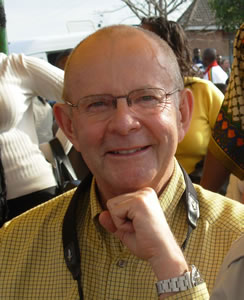
Wilbur Smith (Broken Hill, 9 januari 1933)
De Duitse dichter, schrijver, columnist en journalist Kurt Tucholsky werd geboren in Berlijn op 9 januari 1890. Zie ook alle tags voor Kurt Tucholsky op dit blog.
Versunkenes Träumen
Lieblich ruht der Busen, auf dem Tisch,
jener Jungfrau, welche rosig ist und frisch.
Ach, er ist so kugelig und gerundet,
daß er mir schon in Gedanken mundet.
Heil und Sieg dereinst dem feinen Knaben,
dem es freisteht, sich daran zu laben.
Jener wird erst stöhnen und sich recken;
aber nachher bleibt er sicher stecken. nanana!
Heirat, Kinder und ein häusliches Frangssäh
nichts von Liebesnacht und jenem Kanapee…
Ich hingegen sitz bei ihren Brüsten,
und – gedanklich – dient sie meinen Lüsten.
Doch dann steh ich auf und schlenkre froh mein Bein,
schiebe ab,
bin frei –
und lasse Jungfer Jungfer sein!
Gute Nacht!
Ich geh mit meinen Wanzen schlafen,
rotbraun und platt.
Quartiert bin ich bei einem Grafen,
der viele hat.
Des Nachts, wenn alle Sterne funkeln,
dann ziehen still
die fleißigen Scharen hin im Dunkeln
wie Gott es will.
Sie kommen aus den schmalen Ritzen,
aus dem Parkett;
die feinern aber fastend sitzen
des Tags im Bett.
Sie pieken mich. Es schwillt zu riesigen
Fleischklümpchen an, was sie gepackt;
das macht die Beißekunst der Hiesigen –
die sind exakt.
Sie pieken mich. Es juckt. Zum Glück
ist morgen alles wieder rein.
Und wenn ich eine sanft zerdrücke,
gedenk ich dein.
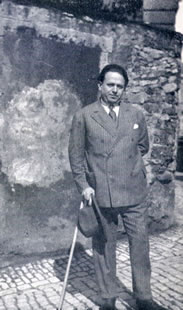
Kurt Tucholsky (9 januari 1890 – 21 december 1935)
In Parijs, 1928
De Ierse schrijver Brian Friel werd geboren op 9 januari 1929 geboren in Omagh, Noord-Ierland, in een katholiek onderwijzersgezin. Zie ook alle tags voor Brian Friel op dit blog.
Uit: Dancing at Lughnasa: A Play
“And when I cast my mind back to that summer of 1936, these two memories — of our first wireless and of Father Jack’s return — are always linked. So that when I recall my first shock at Jack’s appearance, shrunken and jaundiced with malaria, at the same time I remember my first delight, indeed my awe, at the sheer magic of that radio. And when I remember the kitchen throbbing with the beat of the Irish dance music beamed to us all the way from Dublin, and my mother and her sisters suddenly catching hands and dancing a spontaneous step-dance and laughing — screaming! — like excited schoolgirls, at the same time I see that forlorn figure of Father Jack’s shuffling from room to room as if he were searching for something but couldn’t remember what. And even though I was only a child of seven at the time I know I had a sense of unease, some awareness of a widening breach between what seemed to be and what was, of things changing too quickly before my eyes, of becoming what they ought not to be. That may have been because Uncle Jack hadn’t turned out at all like the resplendent figure in my head. Or maybe because I had witnessed Marconi’s voodoo derange those kind, sensible women and transform them into shrieking strangers. Or maybe it was because during those Lughnasa weeks of 1936 we were visited on two occasions by my father, Gerry Evans, and for the first time in my life I had a chance to observe him.”
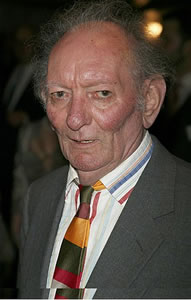
Brian Friel (Omagh, 9 januari 1929)
De Estlandse schrijver August Gailit werd geboren op 9 januari 1891 in Kuiksilla, Sangaste. Zie ook alle tags voor August Gailit op dit blog.
Uit: Toomas Nipernaadi
„I remember something that once happened in town.
One winter’s morning a large company of friends was returning from a night out. We were wearing top hats and white gloves, and we had fine ladies with us as well. Everybody was tipsy, but not too much so, we were frolicking around, laughing, throwing snow at one another. Just as we were crossing Peetri marketplace, I saw a young girl holding a huge basket. The child was blue with cold, her thin fingers like small snakes curled around the handle of her basket. She was shivering in her thin cotton frock, her toes were sticking out from her worn shoes. She was picking horse droppings, used as pig feed by poor people in the slums. I felt sorry for the poor child, and without meaning anything bad, I snatched her basket and began doing her work for her. Many people had already turned up at the market, and quite a few of them stopped to marvel at the unusual sight: a gentleman in a top hat and white gloves picking horse droppings in the street. I was so busy that I failed to hear the first sniggers, the first insults. Within moments, I was surrounded by an angry circle of people. There were apprentices and street sweepers, factory workers and chauffeurs, chimney-sweeps and fruit sellers – they all stood around me and yelled. Somebody pushed me, I fell to the cobblestones, the basket turned over and in an instant I found myself trampled on. Everybody thought it his duty to kick me at least once, as if I were the vilest of the vile. Some time later, when the crowd had dispersed, I saw the same girl standing by the wall. She shook her little fists at me and swore horribly, using words I had never heard before, because I had broken her basket.
You see how the best intentions may turn into the ugliest deeds if you’re out of luck.“
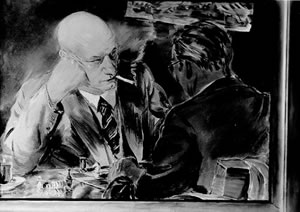
August Gailit (9 januari 1891 – 5 november 1960)
Portret door Eduard Ole, 1932
De Hebreeuwse dichter, schrijver en vertaler Chaim Nachman Bialik werd geboren in Radi, Oekraïne, op 9 januari 1873. Zie ook alle tags voor Chaim Nachman Bialik op dit blog.
On a Summer’s Day
When high noon on a summer’s day
makes the sky a fiery furnace
and the heart seeks a quiet corner for dreams,
then come to me, my weary friend.
A shady carob grows in my garden –
green, remote from the city’s crowds –
whose foliage whispers secrets of God.
Good my brother, let’s take refuge.
Pleasure and tenderness let us share
in the sweet hidden prime of noon,
and the mystery golden rays reveal
when sunlight pierces the rich shade.
When the black cold of a winter’s night
bruises you with its icy pinch
and frost sticks knives in your shivering flesh,
then come to me, blessed of God.
My dwelling is modest, lacking splendour,
but warm and bright and open to strangers.
A fire’s in the grate, on the table a candle –
my lost brother, stay and get warm.
When we hear a cry in the howling storm
we will think of the destitute starving outside.
We will weep for them – honest pitiful tears.
Good friend, my brother, let us embrace.
But when autumn approaches with rain and cloud
and the roof leaks and there’s moth in the heart
and the desolate world sinks, sullen, in mire,
then merciful brother, leave me alone.
I would be alone in the barren time
when the heart withers in slow decay.
Unseen. Unknown. No stranger understands.
Let me grieve alone in my silent pain.
Vertaald door Ruth Nevo
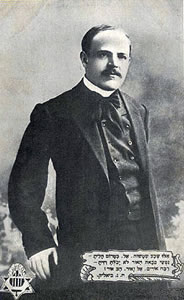
Chaim Nachman Bialik (9 januari 1873 – 4 juli 1934)
Zie voor nog meer schrijvers van de 9e januari ook mijn vorige blog van vandaag.
